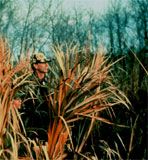| Contact us |
| Try wildfowling |
| Club merchandise |
| Wildfowl art |
| Wildfowling books |
| Join KWCA |
| Search |

BASC/WAGBI
History of BASC
The Wildfowlers' Association of Great Britain
and Ireland, known as WAGBI, was founded by Stanley Duncan, a Geordie.
Stanley Duncan was a highly experienced wildfowler and naturalist and
his object in forming the Association was threefold. He sought to help
the professional wildfowlers, then eking out a meagre living on our coasts;
he was becoming alarmed at the increasing drainage and subsequent development
of much excellent wildfowl habitat and he realised that as time went by
it would be necessary to defend the sport of wildfowling against factors
that were moving contrary to its interests, namely the growing enthusiasm
of extremists bent on total protection of wild birds.
The Threat to Wildfowling
The long expected attack on wildfowling came in 1953, when legislation
which the Association regarded as both unfair, unnecessary and very restrictive,
was introduced in Parliament.
Although a strictly voluntary organisation, with no paid staff, a small
group of public-spirited men gave considerably of their time, energy and
private funds, determined that the interests of wildfowlers be given a
fair hearing and their beliefs recognised and upheld. Many meetings were
convened and thousands of letters written, whilst there was considerable
lobbying of Members of both Houses for, in the opinion of those serving
the WAGBI cause, there had been very considerable misrepresentation of
the true facts.
The protracted and sometimes heated deliberations culminated with the
Protection of Birds Act 1954, which, thanks to WAGBI's intervention, was
a far more balanced piece of legislation than had first been contemplated.
The effect of the publicity and behaviour that preceded the 1954 Act was
so profound that throughout the country there developed a determination
that never again should genuine sportsmen find themselves in similar circumstances.
All over the country those who valued their sporting heritage and its
future began to seek membership, and many of them, with WAGBI's help and
advice, set about forming local clubs and associations, thus bringing
together many who, individually, could do little to safeguard that future,
but collectively could and would - if it became necessary. This did not
mean, however, that wildfowlers would cease to follow their sport singly
or with a companion or two, just as they did in Stanley Duncan's day.
Wildfowl Conservation
In 1949 the Nature Conservancy came into being. Its functions, of relevance
to wildfowlers, were to provide advice on the conservation, control or
protection of natural fauna and to establish, maintain and manage nature
reserves in Great Britain, many of which embrace shooting zones jointly
created and managed with WAGBI.
The Growth of WAGBI/BASC
In 1950 WAGBI had five affiliated organisations, namely Southport &
District Wildfowlers' Association (1887), Morecambe Bay Wildfowlers' Association
(1929), Blakeney and District Wildfowlers' Association (1927), Frodsham
and District Wildfowlers' Club (1938) and the Tay Valley Wildfowlers'
Association (1949). Subsequently it has grown into a huge organisation
some 120,000 members, over 1,600 affiliated clubs and registered shooting
syndicates and a staff of 70.
In 1981 WAGBI changed its name to the British
Association for Shooting and Conservation (BASC). This change was
agreed at the Annual General Meeting of that year in recognition of the
fact that shooting sports required a single representative body and that
WAGBI was the most suitable placed organisation to take on that role.
The formation of local affiliated organisations, now covering all forms
of sporting shooting and not merely wildfowling, with the support and
backing of their parent body, BASC has provided much-needed common meeting
grounds.
The Association is represented on, or works most closely with, many committees
and organisations, including the Countryside Alliance, British Shooting
Sports Council, Central Council of Physical Recreation, Clay Pigeon Shooting
Association, County Conservation Trusts, Crown Estate, Duchy of Cornwall,
Duchy of Lancaster, Game Conservancy, Gun Trade Association Ltd., International
Council for Bird Preservation, International Waterfowl and Wetlands Research
Bureau, National Trust, Nature Conservancy Council, Royal Society for
the Protection of Birds, Water Recreation Sub-Committee of the Regional
Sports Councils, Wildfowl Trust, national, regional and local nature reserve
committees, and FACE (UK) (Federation des Associations de Chasseurs de
la EU), for which we provide the secretariat, Council for Country Sports
and the Standing Conference on Countryside Sports. The last three 'umbrella'
organisations the Association helped to found.
BASC today
The Association's current work, responsibilities and aspirations are complex,
broad-based and becoming more so as the world shrinks, the countryside
changes and the people demand greater access to it
But ours is an ancient and honorable sport that the BASC, as was the case with WAGBI, is determined to maintain for future generations as well as its current devotees.